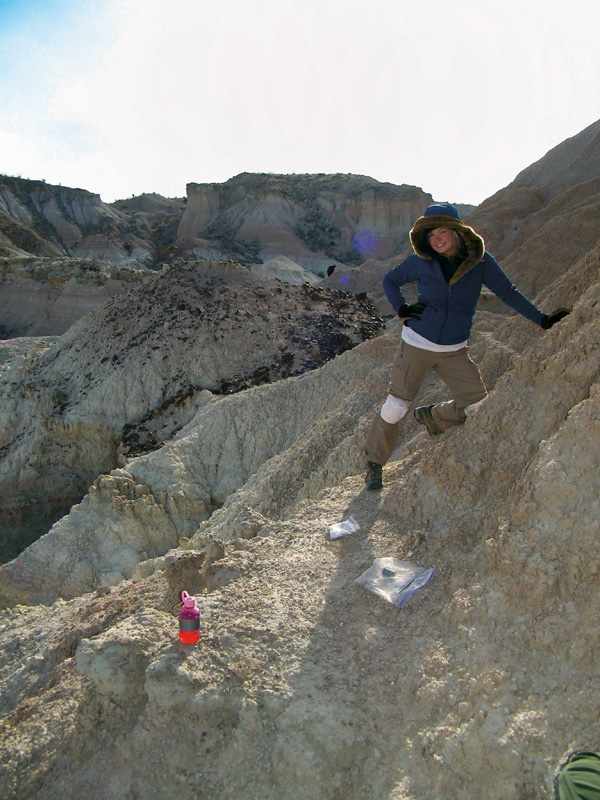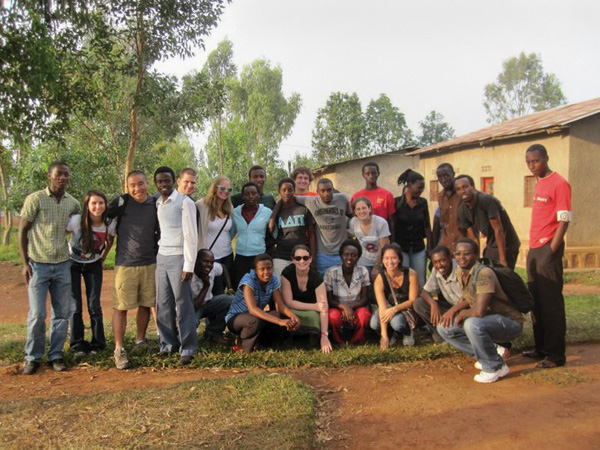Undergrads who conduct research in the field are more likely to thrive in the classroom
For three College of Liberal Arts undergraduates, conducting research with professors provided the skills they needed to succeed and helped them discover just what they wanted to do next.
“Undergraduate research gives you an experience that you’d almost never get in a classroom,” says Marc Musick, associate dean of student affairs and professor of sociology. “Just imagine being an undergraduate discovering things never discovered before and generating new knowledge, and the kind of self-confidence you gain from that.”
Undergraduates who engage in research report more positive outcomes such as a higher GPA, according to a 2010 survey of University of Texas students. And it is particularly beneficial for students who are further along in their college careers and those who are less prepared coming into college as measured by SAT scores and class rank.
Musick says research hones skills that are useful for succeeding in the academic environment and beyond: writing more effectively, increasing critical thinking skills and building a sense of creativity. He also notes the importance of building strong relationships with faculty, some of which may develop into a lifelong mentorship.
The following stories chronicle undergraduate researchers’ experiences in the field.
Fossil Find
Elissa Ludeman’s introduction to the world of paleontology during her first trip to Texas’ Chihuahuan Desert in January 2010 proved extraordinary when she made a significant discovery.
“Definitely my most exciting find to date,” says Ludeman, an anthropology and psychology 2010 University of Texas at Austin graduate, of her fossil find that would later be indentified as a new species. “I was incredibly excited for a chance to see these fossils and teeth first hand. To see and feel a fossil and know I was the first human to see it is incomparable to simply viewing a picture of a fossil in a textbook.”
Ludeman, a native of Spring, worked to collect fossils with University of Texas at Austin physical anthropologist Chris Kirk and a team of researchers at Midwestern State University’s Dalquest Desert Research Site in Brewster County located in the Big Bend region, where Kirk directs an ongoing project to collect Eocene fossils, especially early primates.
During her time in the field, Ludeman was fortunate enough to find an upper jawbone containing the fourth premolar to the third molar. When she found the specimen it was broken in half, but Kirk was later able to glue the two pieces together in the lab. He was then able to confirm that it was an undiscovered species of early primate: Mescalerolemur horneri.

Kirk says the presence of Mescalerolemur, which is only found in the Big Bend region of Texas, comes after the more common adapiforms from the Eocene of North America had already become extinct. This is significant because it provides further evidence of faunal interchange between North America and East Asia during the Middle Eocene.
In the field, Kirk familiarized Ludeman with both surface collection techniques and using morphological markers — such as shape, structure, color and pattern — in field identification of various Eocene fauna.
“Field research exposes students to methods of data collection that they simply can’t learn in the classroom,” Kirk says. “It’s also an intense learning experience — students can learn as much in one day in the field as they can in a week in the classroom or lab.”
While the essence of learning and mentorship is still present, Ludeman describes the conditions in the field as more relaxed, albeit chilly, given that she conducted her fieldwork during record low temperatures.
“Waking up to frozen water bottles and even having my contacts frozen in my contact solution like blocks of ice was certainly a new experience for me,” Ludeman says. “It was in the low teens at night and it was my first time camping.”
Ludeman says the field team usually consists of people from all levels of academia: professors, graduate students, undergraduates, all united with the common goal of finding fossils.
“My best memory of the field was the wonderful excitement of scanning the ground and seeing rock after rock and then finally spotting a beautiful fossil,” she says.“The amazing sunrises and sunsets over the hills of the Chihuahuan Desert were incredible as well.”
Prior to her Dalquest research, during the summer of 2009, Ludeman had completed a field course in Primate Behavior and Ecology at the Institute for Tropical Ecology and Conservation in Bocas del Toro, Panama. While in Panama, she completed an independent research project on primate behavior titled “Interactions of juveniles and adults in Alouatta palliata.”
She studied and quantified the interactions of infant howler monkeys. The results were significant in supporting previous findings that adult males had limited association with infants due to howler monkeys’ promiscuous mating strategies.
“My time in Panama gave me great first-hand experience in the types of sampling techniques used to study primate behavior,” Ludeman says.
Ludeman says both her Panama and Dalquest experiences helped her develop a great respect for the amount of time and effort that go into both fossil collection and wild animal observation.
“It provided me valuable knowledge about how to exist in varied environments: how to hike in the jungle in the rainy season or in a desert in the dry season, how to start fires and camp in non-ideal environments, overall how to deal with the environment practically so that the main focus could be on the project at hand,” she says. “I trust that these skills, both technical and practical, will aid me in my future field work.”
For her undergraduate thesis, Ludeman conducted a comparative morphological analysis between extant primates and mammals to verify hearing ability. She presented her findings at the American Association of Physical Anthropology meeting in April 2011, which Kirk says was very well received.
“She made the first estimates of hearing abilities for several species of early fossil primates,” Kirk says. “It’s the most comprehensive analysis of its kind that’s ever been undertaken.”
“If an undergraduate possesses a genuine interest in the subject then I would encourage them to work on every project they have the opportunity to assist on, go on field work if ever possible, and, although challenging, to undertake an undergraduate honors thesis,” Ludeman says.
Ludeman began a doctorate program in physical anthropology this fall at New York University.
“Undergraduate research opportunities were paramount to my undergraduate career and deciding what path I wanted to take in life,” Ludeman says. “I would not be where I am today without them.”
The Word on Psychology
Anne Norman didn’t start out as a psychology major.
“Don’t be afraid to explore research opportunities in departments outside of your major,” says Norman, a second-year psychology major at The University of Texas at Austin about her work in Professor James Pennebaker’s lab.

After taking an introduction psychology course her first semester, the Seabrook native who was then a government major, says she visited with her professors, James Pennebaker and Sam Gosling, who encouraged her to explore research opportunities in the field.
Norman says her favorite aspect of the class was the obvious passion her professors had for their field and their enthusiasm for sharing their knowledge with their students.
She worked in the Pennebaker Lab during this past spring using Linguistic Inquiry and Word Count technology developed by Pennebaker, the Liberal Arts Foundation Centennial Professor and psychology department chair. This program analyzes writing samples and counts the frequency of different types of words to provide insight into the writers’ personalities.
Pennebaker’s groundbreaking research in computational linguistics was used for his recent book “The Secret Life of Pronouns: What Our Words Say About Us” (Bloomsbury Press, August 2011), which gives amazing insight into personality, emotional health, thinking style, group status and relationships.
“Not only was I assigned tasks that directly helped the lab’s research but I was also taught how to think critically, apply statistics to experimental design and critically read research papers,” Norman says. “This allowed me to test drive life as a graduate student and made me realize that I not only enjoy learning about psychology, I want to be an active part of it.”
Norman says one of the greatest benefits of working in the lab was working directly with graduate student mentor Yitai Seiha, who was pursuing his own research interests.
“Yitai took the time to mentor me in the lifestyle of a graduate student and in how one would conduct psychology research,” Norman says.
Her lab experience complemented many of her psychology classes, providing a practical application of the skills and topics that she had been learning about. A previous statistics and research methods class was also invaluable in helping Norman quickly immerse herself in the academic literature.
Some of Norman’s work has even become part of the examples used by Pennebaker in the classroom.
“From the outset it was clear that Anne was a smart, thoughtful and enthusiastic student,” Pennebaker says. “Although only a first-year student, she volunteered to work with us on several projects. The primary one dealt with how people use language in everyday life.
“Yitai and I were both impressed with Anne’s energy and sense of responsibility,” he adds. “She represents what we all love to see in UT students.”
“When I first arrived at UT, I never thought that I would be capable of carrying out my own research,” Norman says. “But by the second week of my involvement in the lab, Yitai, who asked me if I had any ideas for my independent research, was astounded when I expressed my shock, and then ignited a desire in me to explore my own research interests.”
This fall, Norman is conducting research with a graduate student in the Psychology Department’s Sahara Lab, where she is studying risk behaviors associated with the consumption of alcohol.
Genocide Research Shaped By Rwanda and Bosnia Experience
For Kevin Martin, trips to Rwanda and Bosnia transformed not only his research, but also his life.

“For me, researching was about building relationships, having engaging conversations and experiencing things I could never experience in the classroom or as a tourist,” says Martin, a history, government and humanities honors 2011 University of Texas at Austin graduate.
For his undergraduate thesis, the Mesquite native focused on the role of leadership in genocide, specifically as it relates to the 1990s conflicts in Bosnia and Kosovo.
“It is the single best thesis I have ever received,” says Sheldon Ekland-Olson, Rapoport Centennial Professor of Liberal Arts in the Department of Sociology and Martin’s thesis advisor. “When I think back over the first semesters when Kevin and I had contact and this work he has now produced, I can only marvel at the skills and well-grounded perspective he has developed.”
Martin had initially made it to the final round of interviews for the 2009 Global Youth Connect (GYC) Rwanda winter program as a junior. The international organization accepts only 15 delegates, ages 18 to 35, worldwide to each program, which supports and encourages youth action for human rights and social transformation. That December, he was accepted into the GYC’s summer program in Bosnia and later reapplied for the Rwanda winter program and was accepted there as well.
“In hindsight, it was probably a blessing in disguise that I didn’t go to Rwanda during my junior year,” Martin says. “The spring semester of my junior year represented my biggest period of academic growth and helped better equip me for the experience in Bosnia. By the time I made it to Rwanda during the winter of my senior year, I possessed complete confidence with the work that I was doing.”
Both the Rwanda and Bosnia programs emphasize social justice, activism and reconciliation geared to youth within the context of human rights and development. They combine educational workshops, volunteerism and staying with a local family for an extended time in order to provide experiential and hands-on learning for students.
In Bosnia, Martin had the opportunity to participate in a three-day conflict transformation workshop with local youth and to write grants for a local nongovernmental organization (NGO). He visited more than 40 sites related to the conflict and subsequent recovery in Bosnia, and attended the 15th commemoration ceremony of the Srebrenica genocide.
He and some fellow delegates stayed in the home of the first woman who returned to Srebrenica following the expulsion and genocide of Bosnian Muslims. Martin and a few of the delegates helped her make floral arrangements for the ceremony.

In Banja Luka, Bosnia at an organization called the Genesis Project, Martin observed a puppet show to teach elementary age children to avoid accidents with land mines. According to a U.S. State Department website, as of 2010 there were an estimated 220,000 active land mines throughout the country. And when Martin met with the Defense Ministry of Bosnia during his research, they estimated that there are an additional 800,000 land mines still unidentified.
“The current situation in Bosnia is tremendously complex, and without traveling there I would have never been able to grasp the history and contemporary state of the nation no matter how many books I read,” Martin says.
In Rwanda, Martin visited a number of sites including the Kigali National Genocide Memorial, the Nyamata memorial where 40,000 people were murdered. He interviewed detainees and advocated on behalf of their rights in western Rwanda, and assisted with the annual report for a Rwandan NGO.
“Rwandans refused to be defined by those 100 days in 1994 and are very proud of the fantastic progress that has been made in the last decade,” Martin says.
In Rwanda, Martin stayed four nights with a local Rwandan, Philippe, who was an established hip-hop artist. Philippe lives with six of his closest friends and his sisters, who were all orphaned in the genocide.
“My experiences in Bosnia and Rwanda have fundamentally transformed my outlook on life, my belief systems, the way I treat others and maintain relationships, the way I engage in work,” says Martin, who now works as an admissions counselor for The University of Texas at Austin. “It has equipped me with a stronger capacity of being able to live in the moment without concern for past mistakes and anxieties toward future uncertainties.
“To me, this is invaluable as an end in and of itself even if it doesn’t lead as a means to a career in development work or humanitarianism,” he adds. “I am a better person for having these experiences.”
